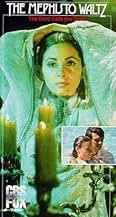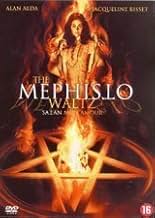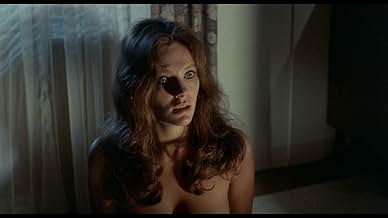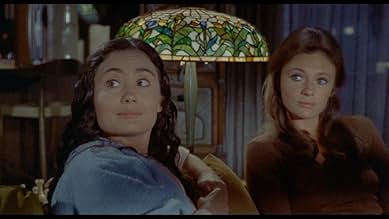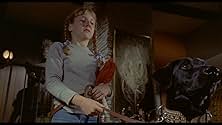IMDb RATING
6.1/10
3.5K
YOUR RATING
An old, dying satanist arranges to transfer his soul into the body of a young concert pianist.An old, dying satanist arranges to transfer his soul into the body of a young concert pianist.An old, dying satanist arranges to transfer his soul into the body of a young concert pianist.
- Director
- Writers
- Stars
- Awards
- 1 nomination total
Bradford Dillman
- Bill Delancey
- (as Brad Dillman)
Curd Jürgens
- Duncan Ely
- (as Curt Jurgens)
Berry Kroeger
- Raymont
- (as Barry Kroeger)
Terrence Scammell
- Richard
- (as Terence Scammell)
Leon Alton
- Pallbearer
- (uncredited)
Antoinette Bower
- Member of Ely's Group
- (uncredited)
- Director
- Writers
- All cast & crew
- Production, box office & more at IMDbPro
Featured reviews
At least two people below comment on the frequent appearance of the boom mike in this film. To clarify, that is the fault of the TV company / Video company for screening the film in the wrong aspect ratio. It is not the fault of the filmmakers. If you saw this film in the cinema there would be no boom mike since the top of the frame would be masked off by the lens gate. The TV company is showing you the full frame of the picture which should not be all visible to the audience.
Whatever moral issues exist in this strange tale of the occult, they vanish as soon as you accept the premise of this story--that a woman would kill another to repossess her husband with both of them in the guise of someone else's body!! It's about as weird as any Tales from the Crypt!
On the plus side, all of it is stylishly photographed and played with a certain amount of relish, at least by Jacqueline Bisset, Curt Jurgens and Bradford Dillman. Biggest flaw is casting Alan Alda in the central role as the pianist who inherits the musical talent of Curt Jurgens when the Satanist dies, bequeathing Alda with his body and soul. Bisset is the wife who slowly comes to suspect that her husband has been taken over by someone else.
Not quite as strikingly original as "Rosemary's Baby", it does have some effective horror moments, notably involving scenes with a rather ferocious black dog and a scene where the Devil is summoned but we never actually see him. Imagination is given free reign here (at least fleetingly), shades of Val Lewton. Perhaps a technique that should have been used more often throughout.
None of it quite makes sense and the ending is a distinct letdown, but there are some chilling moments nevertheless. Bisset and Parkins are beautifully photographed, with Bisset coming out ahead in the acting department, playing the stressed out wife with appropriate fear and tension. Parkins, on the other hand, seems to rely on one frozen expression, sleepwalking through her role, relying solely on her looks to get by in a way that Hedy Lamarr was often accused of doing in films of the '40s.
As for Alan Alda, he is much too bland, lending neither interest nor credibility to a role that demands a strong romantic lead. His career suggests that he is clearly more comfortable in character roles requiring comic flair, not straight dramatic parts. Bradford Dillman is at least a stronger presence in a lesser role.
All in all, not bad for watching when you're in the mood for a tale of the occult. I seem to recall enjoying the book years ago and the film doesn't quite measure up. It emerges as one of those films that could have been much more satisfying with better casting and direction.
On the plus side, all of it is stylishly photographed and played with a certain amount of relish, at least by Jacqueline Bisset, Curt Jurgens and Bradford Dillman. Biggest flaw is casting Alan Alda in the central role as the pianist who inherits the musical talent of Curt Jurgens when the Satanist dies, bequeathing Alda with his body and soul. Bisset is the wife who slowly comes to suspect that her husband has been taken over by someone else.
Not quite as strikingly original as "Rosemary's Baby", it does have some effective horror moments, notably involving scenes with a rather ferocious black dog and a scene where the Devil is summoned but we never actually see him. Imagination is given free reign here (at least fleetingly), shades of Val Lewton. Perhaps a technique that should have been used more often throughout.
None of it quite makes sense and the ending is a distinct letdown, but there are some chilling moments nevertheless. Bisset and Parkins are beautifully photographed, with Bisset coming out ahead in the acting department, playing the stressed out wife with appropriate fear and tension. Parkins, on the other hand, seems to rely on one frozen expression, sleepwalking through her role, relying solely on her looks to get by in a way that Hedy Lamarr was often accused of doing in films of the '40s.
As for Alan Alda, he is much too bland, lending neither interest nor credibility to a role that demands a strong romantic lead. His career suggests that he is clearly more comfortable in character roles requiring comic flair, not straight dramatic parts. Bradford Dillman is at least a stronger presence in a lesser role.
All in all, not bad for watching when you're in the mood for a tale of the occult. I seem to recall enjoying the book years ago and the film doesn't quite measure up. It emerges as one of those films that could have been much more satisfying with better casting and direction.
Another variation on the damnation of Faust ,this waltz borrows from "mad love" -particularly the French version ("the hands of Orlac" ) starring Mel Ferrer as a pianist -and mainly from Levin's "Rosemary's baby" :the new friends whom the husband (Alda) find nice and helpful whereas the wife finds them intrusive :the "bargain " is even worse than in Polanski's movie.
The "supernatural " scenes are not convincing (nothing to match Rosemary's nightmare) ,but Jacqueline Bisset is an excellent actress (on the other hand ,Alan Alda is inexpressive, the changing in his personality does not really show) who carries the movie on her shoulders, and she gets strong support from Barbara Perkins as disturbing Roxanne and seasoned German actor Curd Jurgens.
Add a good final twist : you do not realize at once what really happened.
The "supernatural " scenes are not convincing (nothing to match Rosemary's nightmare) ,but Jacqueline Bisset is an excellent actress (on the other hand ,Alan Alda is inexpressive, the changing in his personality does not really show) who carries the movie on her shoulders, and she gets strong support from Barbara Perkins as disturbing Roxanne and seasoned German actor Curd Jurgens.
Add a good final twist : you do not realize at once what really happened.
Quinn Martin Productions venture into theatrical films as opposed to its television work is a tidy little entry in the Satanic genre which the late 1960s and early 1970s were chock full of and it is sad that we do not see such films today.
The stunning beauty Barbara Parkins and the irrepressible Curt Jürgens steal the show and turn in performances that dwarf the rest of the cast. This is a low budget film and yet without all of today's special effects it is readily more thrilling and frightening than the typical horror film of contemporary American film.
Thank heavens it is on DVD I saw it originally and now eagerly seek to have it for my collection.
The stunning beauty Barbara Parkins and the irrepressible Curt Jürgens steal the show and turn in performances that dwarf the rest of the cast. This is a low budget film and yet without all of today's special effects it is readily more thrilling and frightening than the typical horror film of contemporary American film.
Thank heavens it is on DVD I saw it originally and now eagerly seek to have it for my collection.
The first indication that this is going to be a science fiction/fantasy film is the fact that Alda is married to Bisset! Doubtful..... They play a relatively happy couple who become embroiled into the lives of an eccentric concert pianist (Jurgens) and his rather creepy daughter (Parkins.) As Alda continues to find himself in the world of the very rich and very indulgent Jurgens, Bisset realizes that something is very wrong. It seems that Jurgens wants to (with a little help from Satan) put his soul into Alda's body. (It is emphasized that it's due to his incredible piano hands, not for any other esoteric things that Alda has to offer......though, truthfully, this is probably about the best Alda ever looked.) Though Alda gets top billing, this is really Bisset's story as she tries to navigate the world of the devil cult before they can set their sights on her daughter who is next on the list of conquests. These transformations are punctuated by the appearance of a dab of Wisk detergent on the receiver's forehead. (Oddly, no one in the film seems to particularly want to be Bisset, who is one of the most glorious women ever to be seen on film, even if here her hair is a bit fly-away and she wears little make-up.) The film has a sort of souped-up TV movie quality to it, no doubt due to the producer Quinn Martin who created so many memorable 1960's and 1970's TV series. It's just a retread of the more popular (and better done) "Rosemary's Baby". Here, the director doesn't take the time to make the coven of worshippers memorable, even though they are played by familiar character actors in most cases, and they are hardly utilized at all. It's difficult to work up much familial concern for Alda, Bisset and their daughter Ferdin since they are hardly ever seen together. Ferdin, after one initial glimpse, is mostly just referred to until later in the movie. Alda gives a very sedate performance for the most part. He seems horribly miscast. Bisset does pretty well until the ridiculous ending throws the movie off it's track. Parkins is good as the icily evil daughter. She and Jurgens share a memorably disturbing kiss. Widdoes tries to bring dimension to the standard best friend role. Dillman (oddly billed as "Brad") does a decent enough job as Parkins' former husband. Jerry Goldsmith provides a nerve-jarring score which is sometimes a bit too over the top for it's own good. It's fun to watch in a kitschy way. (Check out those main titles!) Moss Mabry has some fun with the costuming at times (notably at a risque costume ball.) There's also a convincingly nasty little dog that Bisset has to contend with. All in all, an enjoyable enough film for a mild shock or two and some creeps, but by no means is it a great film.
Did you know
- TriviaHas the singular distinction of being the only theatrical film produced by Twentieth Century-Fox during the entire calendar year of 1970, this due to financial reversals incurred by the studio when several of its recent films failed at the box office.
- GoofsAt various points during the film, the demonic potion bottle varies between a clear glass bottle partially filled with blue liquid and a blue glass bottle in which the liquid cannot be seen.
- Quotes
Duncan Ely: People should be born at the age of 70 and live their life backwards.
- Alternate versionsAn alternate cut of The Mephisto Waltz ran on the Flix network in the early-mid 2000s. This version includes two memorable differences: a much longer floor shot close up of the Doberman's head wearing the Halloween mask, and a shot of Satan's hooves when he visits Paula Clarkson (Jacqueline Bisset) during her Satanic ritual.
- ConnectionsFeatured in Cinemacabre TV Trailers (1993)
- How long is The Mephisto Waltz?Powered by Alexa
Details
- Release date
- Country of origin
- Languages
- Also known as
- The Mephisto Waltz
- Filming locations
- Avenue of the Stars, Century City, Los Angeles, California, USA(Paula Clarkson walking over bridge in Century City)
- Production company
- See more company credits at IMDbPro
- Runtime1 hour 55 minutes
- Color
- Aspect ratio
- 1.85 : 1
Contribute to this page
Suggest an edit or add missing content





